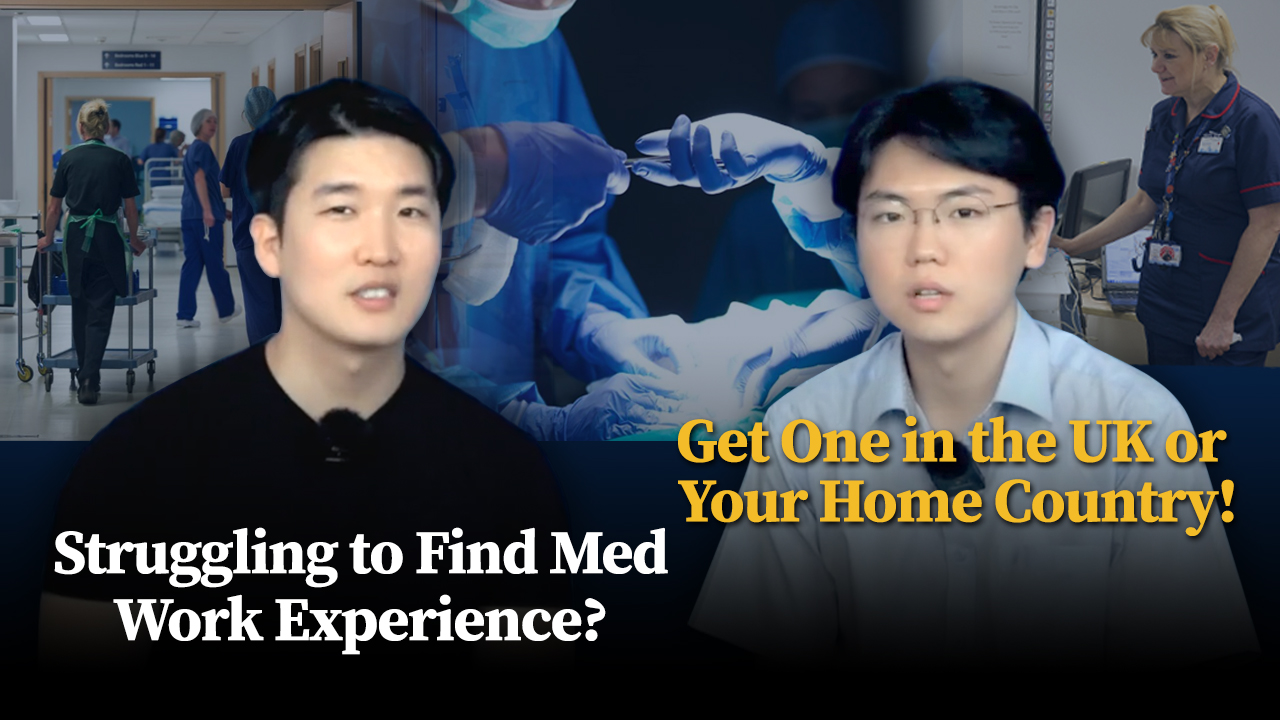
14 Jul
2025
How to Gain Hospital Work Experience for UK Medical School Applications? – Key Tips from Oxbridge Solution's Medical Mentor
<figure class="media"><div data-oembed-url="https://www.youtube.com/watch?v=GC8cbVhYRnE&t=191s"><div style="position: relative; padding-bottom: 100%; height: 0; padding-bottom: 56.2493%;"><iframe src="https://www.youtube.com/embed/GC8cbVhYRnE" style="position: absolute; width: 100%; height: 100%; top: 0; left: 0;" frameborder="0" allow="autoplay; encrypted-media" allowfullscreen=""></iframe></div></div></figure><p> </p><p>For students aspiring to apply to UK medical schools, hospital work experience is undoubtedly a crucial part of the application process. Without this experience, gaining admission to medical school can be difficult. So, how can you acquire hospital work experience? How can international students overcome geographical barriers? And if you’re unable to obtain clinical work experience, how should you prepare? Today, Junhyung H., a medical mentor at Oxbridge Solution, shares valuable insights and advice to help you stand out in the application process.</p><p><img src="https://oxbridge-blogs-1.s3.ap-northeast-2.amazonaws.com/2NPD415sDNBE5MTIZm6h.png"></p><figure class="image"><img></figure><h4><strong>Why is Hospital Work Experience So Important?</strong></h4><p>Junhyung emphasizes the importance of hospital work experience. As an applicant to medical school, you need to demonstrate your passion and commitment to medicine, and hospital work experience is the most direct way to do so. Through this experience, you can showcase your communication skills, empathy, and ability to work under pressure, while also gaining practical clinical knowledge and experience, which is essential for your medical school application.</p><p> </p><p><strong>Types of Hospital Work Experience</strong></p><p>Hospital work experience can generally be divided into two categories: clinical work experience and non-clinical work experience.</p><p><strong>Clinical Work Experience:</strong> This is the most preferred type of work experience, where you work alongside doctors in actual clinical activities, including interacting with patients and observing doctors in their daily duties. Through these experiences, you can learn medical knowledge and clinical skills, and observing advanced procedures like surgeries can significantly enhance your application’s competitiveness.</p><p><strong>Non-Clinical Work Experience:</strong> This type typically occurs outside of hospitals, such as in research labs or community volunteer work. Although these experiences are generally less valued, they still demonstrate your passion for medicine and your sense of social responsibility.</p><p> </p><p>Junhyung points out that while non-clinical experience may not significantly boost your application, combining it with clinical experience, volunteering, or research can provide a well-rounded portfolio, which will help you stand out.</p><p> </p><h4><strong>How Can International Students Find Hospital Work Experience Opportunities?</strong></h4><p>As an international student, especially from a country with a primarily private healthcare system, gaining hospital work experience can be more challenging. Junhyung suggests several ways international students can gain this experience:</p><p><strong>Leverage Personal Connections:</strong> By using family, friends, or relatives who work in the healthcare industry, you can try to secure observational opportunities at hospitals or clinics. Although this method may not be as formal as the typical application process, leveraging personal connections often makes it easier to gain such opportunities.</p><p><strong>Private Clinics:</strong> If you can’t get into a public hospital, consider reaching out to private clinics. Doctors may be more willing to accept students for observation, especially in smaller clinics, where opportunities are more accessible.</p><p><strong>Volunteer Work:</strong> In addition to clinical experience, participating in volunteer work, especially in medical assistance projects in poorer regions or developing countries, is another excellent option. Junhyung shared his own experience working in Laos, which greatly enriched his application.</p><p> </p><h4><strong>How to Showcase Your Work Experience in Personal Statements and Interviews?</strong></h4><p>In the UCAS application, work experience is not a separate section but needs to be detailed in your personal statement. Junhyung advises using the STAR method (Situation, Task, Action, Result) to structure your description of work experience. This method allows you to clearly demonstrate the tasks you performed during your internship while highlighting your reflections and growth.</p><p> </p><p>Additionally, in medical school interviews, interviewers will often ask about what you learned during your work experience. Junhyung stresses that it’s crucial to demonstrate your reflective abilities and personal growth. The focus isn’t on what “advanced” work you did, but on what you learned from the experience and how these lessons will help you in your future medical career.</p><p> </p><h4><strong>Summary and Advice:</strong></h4><p>*Hospital work experience is essential, especially clinical experience. If you lack this experience, it’s advisable to delay your application to UK medical schools.</p><p>*Accumulate diverse experiences, not only limited to clinical work but also including non-clinical volunteer work, etc.</p><p>*Demonstrate reflection and growth by using the STAR method to clearly showcase your learnings from work experience, and discuss them in detail in your personal statement and interview.</p><p> </p><p>Whether you’re in the UK or elsewhere, finding and showcasing your hospital work experience is key to a successful medical school application. Even if you didn’t accomplish extraordinary feats during your internship, as long as you can show your concern for patients, passion for medicine, and deep reflection on your experiences, your application will still be highly regarded.</p>